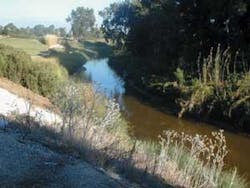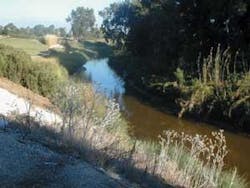Alexander River cleanup wins international Theiss prize
By Martin Rosenberg
The clean up of the Alexander River received top prize at the Australian 2003 Theiss River prize competition, beating out efforts involving more famous rivers such as Europe's Danube and rivers in China, India and the United States.
The Environmental Services Division of the major Australian construction company Thiess Pty Ltd established the annual prize in 1999 to bring greater public attention to the need for river restoration and highlight the most innovative, successful attempts at river restoration currently underway.
The once-polluted Alexander River is being heralded as a sterling example of how a river degraded for decades by agricultural waste and pollution can be reclaimed. The Alexander River belts Israel at its narrowest point east of Netanya. Its restoration has inspired low-key Israeli-Palestinian cooperation on the local level that continues to this day despite the political upheaval and violence. Furthermore, it gives fresh impetus to an environmental ethic in a small country that has not often had the luxury of such concerns.
Credit for the Alexander's restoration largely goes to Nahum Itzkovitz, the elected leader of the Emek Hefer Regional Council near Netanya, and Amos Brandeis, a 38-year-old architect he enlisted to design and put in place infrastructure for the river cleanup.
A group of reservoirs and wastewater treatment facilities completed last year in Yad Hannah are at the heart of the cleanup campaign. The Jewish National Fund and the Israeli government funded the plants and nearby facilities, on the Israeli side of the border, with the Palestinian town of Tulkarm.
In Nablus and Tulkarm, Palestinians have been wrestling with a growing environmental nightmare for years. Untreated human sewage flows into the Nablus River, the Alexander's main tributary for much of the year. In addition, Tulkarm residents contribute raw sewage to the Alexander. Indeed, waste generated by 240,000 Palestinians, olive oil presses in late fall and stone-cutting plants contaminate the Alexander at scores of different sites, reportedly causing human health problems.
The German government agreed to fund efforts to address the problem in the Palestinian cities, beginning with work on sewage treatment ponds near Tulkarm, which have been in disrepair. Talks about the water pollution problems between the Israelis, Palestinians and Germans have continued for several years.
In 1995, Israel began to clean up the river. Just past the border between Israel and the West Bank, water is diverted into the Yad Hannah settling ponds and state-of-the-art purification equipment. The Israeli Minister of the Environment and the Jewish National Fund provided funds for the facilities, which cost about US$ 4 million. "The new plant is just the first stage of the final project, which should be built in cooperation with both sides on the border," Brandeis said.
Meanwhile, other polluted rivers in Israel await attention. "The same problem of pollution can be seen in other rivers in Israel, but not much has been done yet, and anyhow not in cooperation with Palestinians," Brandeis added.
Still, much has been accomplished to improve water resources in the Emek Hefer region. Dairy farm waste and settlements' effluents have been diverted into three large reservoirs. Treated water is then pumped into local orchards, easing the burden on the region's scarce water supply.
Hiking trails and picnic areas have been set up along the banks of the newly restored Alexander River. Families flock to the area on summer weekends. Part of the tug is the remarkable, gigantic Nile soft-shelled turtle. The rare turtles, which have vanished from many former habitats around the Mediterranean, are making a rebound in the Alexander.
In the future, more work needs to be done to fully restore the Alexander. Public meetings must be held, projects executed, particularly by the Palestinians. Yet much has been accomplished to bring the project to its current international prominence.
Author's NoteMartin Rosenberg is a freelance writer journalist specialising in water, energy and telecommunications issues, and is based in Overland Park, Kansas, USA; Email: [email protected].

